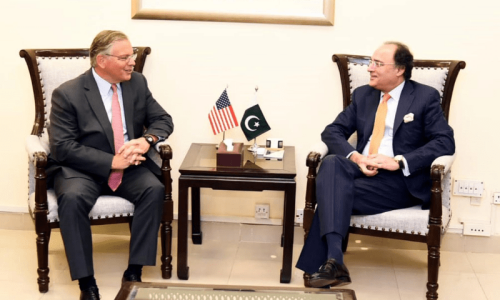 WITH the recent signing of an agreement between the Institute of Business Administration (IBA) and the International Finance Corporation, a World Bank subsidiary, the chant of encouraging good governance practices has certainly hit an octave note. At another level, it also indicates the seriousness with which the idea at the most basic tier of the corporate ladder; the business school, is to be pursued.
WITH the recent signing of an agreement between the Institute of Business Administration (IBA) and the International Finance Corporation, a World Bank subsidiary, the chant of encouraging good governance practices has certainly hit an octave note. At another level, it also indicates the seriousness with which the idea at the most basic tier of the corporate ladder; the business school, is to be pursued.
The concept being promoted under the banner of Good Governance Practices for the last few years is apparently quite simple – better transparency leads to improved professionalism which, in turn, means enhanced profits. Anyone who has anything to do with the corporate world, however, realises how tricky the task actually is because it involves changing mindsets and habits of a lifetime. By bringing business schools into the loop, those behind the effort hope to pick the future business leaders early and inculcate in them a sense of respect for the tested and tried corporate procedures.
As described by IBA Director Danishmand, the agreement has an initial life of one year during which the IFC will provide it with global literature on the subject and help it devise a curriculum in keeping with the latest trends The process, in fact, has already started and the IBA is busy these days localising and integrating the IFC input to make the case studies relevant to our society. Once ready, these courses will be included in the various degree programmes that are offered by the IBA, such as the BBA, the MS and the MBA.
Though the agreement carries no cash component, the IFC will arrange workshops and resource material to train the IBA faculty for effective execution of these courses and assess their performance frequently to ensure world class teaching standards.
The IBA already runs a number of refresher courses for executives working at middle and senior levels in the corporate hierarchy, but this activity is likely to pick up further momentum under the agreement with the IFC. For instance, IBA is planning to make available its stuff on corporate governance in Urdu language to reach out to family businesses for which there has been a language barrier thus far.
Pakistan became a member of the IFC way back in 1956, but the Pakistan Corporate Governance Project (PCGP) is a much recent phenomenon and is part of the reform process that has been initiated in various other sectors, like those in bureaucracy, judiciary and such other areas.
Kaiser Naseem, who heads the Project, says the basic aim is to assist the corporate entities in training their board of directors, undertaking corporate governance assessments and help them put in place relevant improvement programmes. “We have also conducted workshops for the judiciary, government servants, bankers, etc to create an awareness of corporate governance practices worldwide,” he says.
The IFC is also providing technical support to the Pakistan Institute of Corporate Governance (PICG), which was set up in December 2004 as an independent public-private partnership. It is a large grouping that includes, among others, the Securities and Exchange Commission of Pakistan, the State Bank of Pakistan, the stock exchanges at Karachi, Lahore and Islamabad, banking and insurance associations, apex bodies of the chambers, professional bodies of accountants and company secretaries as well as the academia.
According to Fuad Hashimi, Chief Executive Officer of the PICG, the Institute is involved in training and education, creating awareness, undertaking research, publishing guidelines and other resource material. Besides, it provides a forum for discussion on issues related to corporate governance.
The institute received a good response last year when it launched its Board Development Series with the help of the IFC. A pioneer group of 35 directors completed the programme which comprised four sessions of six modules each. Successful participants were certified as Chartered Directors by the PICG. The certification is internationally accredited by the US-based RiskMetrics, which is one of the world’s largest service providers in this specific field.
So far, the bulk of the effort is directed towards board of directors running companies listed on any of the three stock exchanges, but, as pointed out by Mr Hashimi, the time is ripe to move further. The first step ahead in this direction is the mechanism of Orientation Workshops under which the PICG is planning to spend time with members of various boards of directors to sensitise them on the issue and enable them to assess possible benefits.
Such initiatives along with IFC and PICG efforts to take business schools on board mean greater and much more focused activity in the days ahead. According to the IBA website, it is the first such institution to have signed an agreement with the IFC, but it will not have this exclusive status for long. According to Kaiser Naseem, the IFC is in touch with others as well, including the FC College, the Lahore University of Management Sciences (LUMS), the National University of Science and Technology (NUST) and a few more.
There is no dearth of people who see the IBA-IFC agreement in the context of the announcement related to the appointment of former State Bank governor Dr Ishrat Hussain as the next IBA director. His capacity as the Chairman of the National Commission on Governance Reforms (NCGR) and his longstanding equation with the international financial agencies is making people do their own calculations, but IBA officials deny any such linkage.
Dr Ishrat was expected to undertake his new assignment late last month, but then came the news that he was preparing a detailed NCGR report in Dubai and would not be available till at least a couple of months. There are indications that a notification confirming his appointment (or a decision otherwise) would be issued by the next government. Till then, the status quo will continue. Against this backdrop, the insistence of IBA officials that the agreement with the IFC has nothing to do with the possible change of command at the institute does make sense.














































Dear visitor, the comments section is undergoing an overhaul and will return soon.